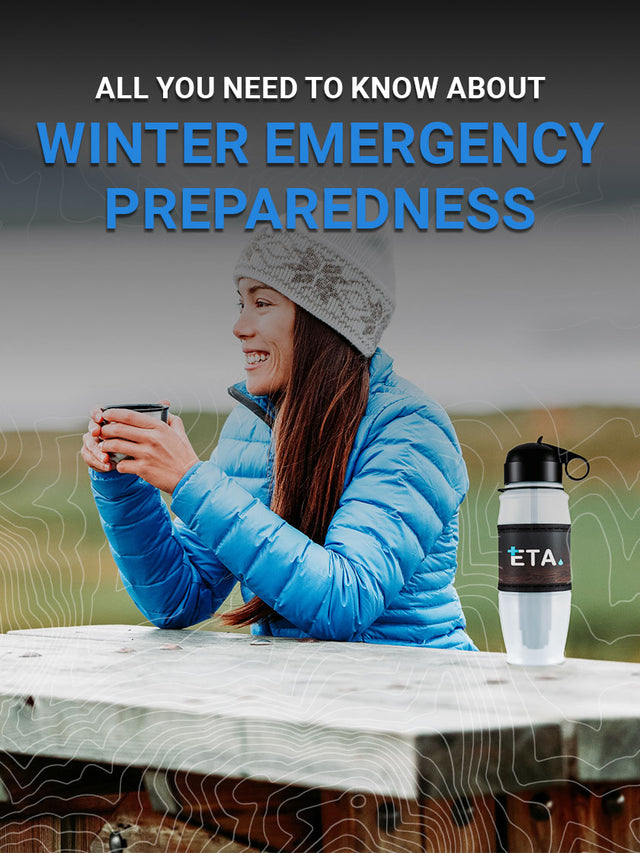
All You Need To Know About Winter Emergency Preparedness
No matter which part of the U.S. you live in, almost all Americans are likely to experience some form of winter weather at some point in their lives, even though the intensity varies and differs across the nation. Winter storms can produce light snowfall over a short period of time or heavy, wind-driven snowfall lasting many days. A lot of winter storms are accompanied with icy conditions, sleet, freezing rain, high winds, and dangerously low temperatures. And that is why it is important to be more aware of winter emergency preparedness.

What do you need to do?
All individuals should be prepared to face any emergency that might come without warnings. If you are aware about the geographical conditions of your region and stay up to date with weather reports and warnings, preparedness should keep you covered up for any circumstances that may arise out of the usual. Everyone needs to be ready for any catastrophe by formulating a plan and assembling an emergency preparedness kit, regardless of the threat or hazard that may exist. Anybody can experience an emergency at any time but if you are ready for tomorrow with a proper plan ahead and put together a kit then you are more safe than any other. Wise ones know: Prepared, not scared is the mantra to successful preparedness.
Tips on winter emergency preparedness
Winter storm season is in full force, so it's crucial to know how to protect your family, property, and yourself. Here are some actions you may take to get ready before the fierce storm arrives.
- Have a stock of food items
It is important to make sure you have a sufficient supply of food as it is necessary to stay indoors and avoid traveling during a winter storm. Many non-perishable things should be in your pantry so that you won't have to worry about any spoilage in foods if you lose electricity. It is a great prepping trick to store enough food at hand that can suffice you at least three days.
Before the storm hits, it is more practical and easy to stock up on items like crackers, granola bars, soups in cans, canned meat, hot cocoa, instant coffee, peanut butter, honey, bread, and cereals such as barley, rice or oats as they are easy to handle with. And also, don't forget to store up food for your pets if you have any.
- Have enough water
It is very important to stay hydrated during the winter seasons to avoid winter dehydration and conditions like hypothermia. With the cold weather, our body insists on water but we might not feel it due to the cold and this leads to dehydration. To maintain suitable body temperatures, our body needs to have a proper supply of water. With proper consumption of water, the body is healthy and functional.

With the ETA Alkaline Water Filter Bottle, you can ensure access to pure and clean water even in the cold temperature. It provides the best filtered water which is promising of 99.99% free of contaminants while also boosting the pH to a level of 9.5 for a healthy hydration. A simple trick would be to store any available water (except saltwater) without having to worry about its drinkability and prior to consumption, filter it using the ETA to ensure safety.
- Pick up your medications and hygiene supplies
Ensure that you tick off all of your prescriptions for medications on your checklist so that you have enough on hand to last at least three days, if possible a week to be safe. This will spare you from drugstore and pharmacy runs on a bad day in the cold weather. Additionally, you should prepare a supply of any hygiene products or sanitary items you might require. If water is scarce, it can also be beneficial to grab some moist toilet paper.
- Backup power supply
Before the storm, charge your smartphones, and make sure you have some portable battery backups available in case the power goes out. Additionally, it's better to keep flashlights or battery operated lights nearby so you won't have to fumble at home looking for them.
You might want to think about acquiring a generator if you live in a place where power outages occur frequently. If you have a portable one, fill it up with gas or fuel before the storm so you may use it as long as you need to.
5. Keep your emergency kit

Make sure you have quick access to everything you might need in an emergency before the storm hits. It is best to waterproof some of the goods in your emergency supply kit so that anything that could be damaged by water can be sealed inside airtight, waterproof plastic bags. In case you need to leave quickly, it is better to pack everything you need into one or two lightweight luggages. First aid supplies, ETA bottle, a weather radio, medications, flashlights, extra batteries, a whistle to signal for help, local maps, cash or traveler's checks, copies of important family documents, a fire extinguisher, waterproof matches, candles, blankets, and sleeping bags should all be included in your emergency kit. If you’re evacuating with children or pets, consider their essentials as an important aspect to prep for while packing your emergency kit.
- Protect your water pipe systems
You should take safety measures to protect your water pipelines if temperatures are predicted to drop to 28°F or below for four hours or longer. A frozen pipe will not only stop your water from flowing, but because water expands when it freezes, it may also cause metal or plastic pipes to explode. This is one of the most significant and expensive effects of winter storms. Allow cold water to drip from faucets that are served by exposed pipes to assist prevention of frozen pipes since running water is less likely to freeze. Let warm air travel near plumbing by opening the cabinet doors in the kitchen and bathroom. Any pipes that are particularly prone to freezing should have pipe insulation added.
- Seal your doors and windows
Drafty windows and doors can let warm air out while letting chilly air in. Since you can get an insulation kit at any hardware shop, it is a good idea to seal any windows. Additionally, you may purchase weather stripping there to improve the seal on your front door. In order to help keep the warm air inside the house, you can also purchase insulated blinds.

- Carbon monoxide and smoke detectors should be tested or installed
Be careful to test and confirm the functionality of your carbon monoxide and smoke detectors. To keep your family safe, it is essential to replace existing detectors with ones that operate in the event of a power outage if they aren't already battery-powered or battery-backed.
Make sure to follow a proper plan for winter emergency preparedness and avoid the harmful effects that can affect you and your loved ones. When done the right way, preparedness can be the answer to any and many emergencies, natural or manmade. Stay safe this season with these important tips that can assist you and your family equally to make the most of it. Happy winters!
